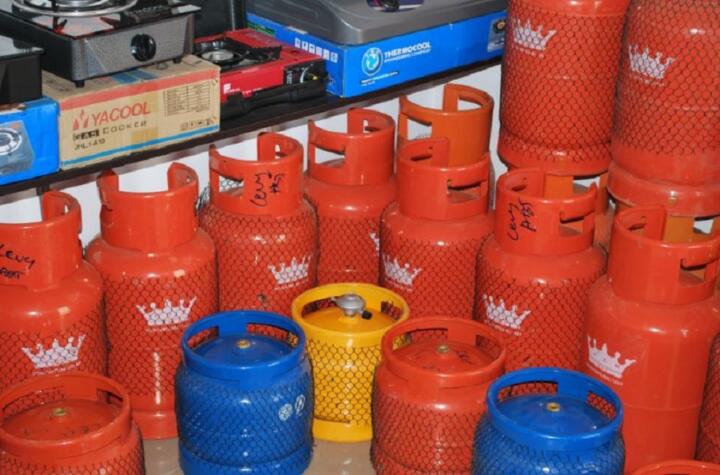Retailers across Nigeria have confirmed a significant decline in the price of Liquefied Petroleum Gas (LPG), popularly known as cooking gas, with the commodity now selling for about ₦1,400 per kilogram in many parts of the country. The development marks a welcome relief for households and businesses that have endured weeks of sharp price increases driven by supply disruptions and logistics challenges.
The decline in price follows improved supply conditions across major distribution hubs, as dealers begin to receive increased deliveries from both local producers and importers. Many gas retailers said the market is beginning to stabilise after a period of volatility that saw prices soar to between ₦1,800 and ₦2,000 per kilogram in some urban areas.

Retailers attributed the price drop to the gradual restoration of loading operations at depots and a better balance between demand and supply. In some parts of Lagos, Abuja, and Port Harcourt, consumers confirmed that gas prices have dropped by as much as ₦400 to ₦600 per kilogram within the past two weeks.
A gas dealer in Lagos said, “The situation has improved compared to last month when supply was low. Prices have dropped because we are now getting better allocations from suppliers. We used to buy at high depot rates, but things are beginning to normalise.” He added that further reductions are expected in the coming days as new stock purchased at lower prices enters circulation.
Consumers, who have been struggling with the high cost of cooking gas, welcomed the development with optimism. Many said the price relief would help reduce the burden on household expenses, especially as food inflation continues to rise. “Last month, I paid almost ₦2,000 per kilogram. Now I can refill at ₦1,400. It’s still high compared to last year, but at least it’s better than before,” said a resident in the Gwarimpa area of Abuja.
Industry operators explained that one of the major reasons behind the recent price reduction is the improvement in supply from local sources. The temporary industrial action by petroleum workers that disrupted loading activities at terminals has been resolved, allowing for smoother operations. In addition, refineries supplying domestic LPG reportedly reviewed their pricing to reflect market realities, making it easier for retailers to access affordable stock.
Another factor influencing the downward trend is the decline in international LPG prices and shipping costs. Importers say the global market for liquefied gas has seen moderate price corrections, which have translated into marginally cheaper landing costs for Nigerian buyers. However, they cautioned that the exchange rate still plays a key role in determining local prices, given that a significant portion of LPG consumed in Nigeria is imported.
Despite the improvement, some retailers noted that the current prices remain above what many consumers can afford. They explained that many retail outlets are still selling at ₦1,500 per kilogram or slightly higher because they are yet to exhaust old stock purchased at elevated prices. “We bought at high depot prices last month, so we must sell off those cylinders before adjusting to the new rate,” one dealer in Ibadan explained.
Experts in the energy sector said the decline in LPG prices highlights the importance of consistent supply and policy coordination. They noted that while the drop is encouraging, it may only be temporary unless government and industry stakeholders address structural challenges in the domestic gas value chain. These include insufficient storage capacity, inadequate transport infrastructure, and the high cost of cylinder ownership, which continues to discourage many households from switching to gas.
Energy analyst Dr. Amina Sadiq noted that while the fall in prices provides short-term relief, long-term stability can only be achieved through investment in local production and distribution infrastructure. “Nigeria has enough natural gas reserves to meet domestic needs, yet logistics and policy inefficiencies keep prices unstable. We must fix the entire value chain to make LPG affordable and reliable,” she said.
She also stressed the need for government incentives to encourage private sector investment in gas bottling and cylinder manufacturing. “Local production of cylinders and accessories will make gas adoption easier for low-income households and reduce dependence on imported equipment,” she added.
Meanwhile, consumers’ advocacy groups have called on the federal government and regulators to monitor the market closely to prevent arbitrary price hikes by middlemen. They urged authorities to promote transparency and enforce fair competition among suppliers.
The federal government has repeatedly emphasized its commitment to promoting LPG use as part of efforts to reduce reliance on firewood and kerosene, which contribute to environmental pollution and deforestation. However, inconsistent pricing and supply disruptions have continued to frustrate the goal of making cooking gas the primary domestic fuel in Nigerian homes.
As the price of cooking gas continues to decline, stakeholders hope the trend will persist, allowing more households to embrace cleaner, safer energy sources. Retailers say that if supply remains stable and logistics costs are managed effectively, the price per kilogram could drop below ₦1,200 in the coming weeks.
For millions of Nigerians who depend on cooking gas for daily use, the recent reduction represents a glimmer of hope amid tough economic conditions. The development reinforces the critical need for sustained reforms, investment, and policy consistency to ensure that affordable and clean energy becomes accessible to all citizens.
Support InfoStride News' Credible Journalism: Only credible journalism can guarantee a fair, accountable and transparent society, including democracy and government. It involves a lot of efforts and money. We need your support. Click here to Donate
